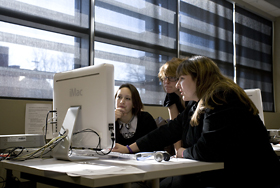Tips to avoid exam stress
Love them or hate them, exams are a part of being a student. And they’re right around the corner.
Exams can lead to stressful times for some students. For others, they’re an opportunity to rise to the challenge and excel.
There are key things students can to do beat stress, rock their exams and come out the other side happy, healthy and content.
Chart a plan of action
Preparation is the most important element in exam success and reducing stress, says Owen Moran, Health Promotion Specialist at Concordia Health Services: “You need to identify first if you are, in fact, stressed.”

Stress symptoms can include anxiety, elevated heart rate, stomach cramps, difficulty sleeping and irregular eating patterns. Some people experience a lowered ability to concentrate and remember – key faculties that are vital for exam success.
“If you’re stressed, identify what the stressor is,” says Moran. “Stress is a response to danger. If it is specifically the exam, why is this exam a danger?”
Students should also take stock of their resources and time constraints. “For example, if you know you need six hours to study and you only have two, there’s an imbalance,” he says.
Visualization helps: imagine completing an exam, handing in an assignment or finishing an essay.
Time management
Set a schedule and stick to it. “Schedule all activities, including downtime,” says Irene Petsopoulis, Counsellor at Concordia’s Couselling and Development. “Address issues as they come so you don’t get to the crisis point.”
Petsopoulis also suggests anticipating unforeseeable situations that can set priorities off-course. To remain in control, stay focused on goals yet flexible enough to adjust.
Healthy diet, exercise, sleep
It might seem like wolfing down a slice of greasy pizza, drinking buckets of coffee staying up all night to cram is necessary, but it’s not. At all.
In fact, it probably makes for worse performance. Eating, exercising, and sleeping well are extremely effective ways to reduce stress and preparing for exams.
A balanced, healthy diet provides the needed strength for weeks of exams. Make sure to eat at least a little something at breakfast: Fruits, veggies, and nuts are great snacks or on-the-go during packed days.
For dinner, a home-cooked meal is a good idea. Moderating intake of fat, sugar, alcohol and caffeine is also recommended. Consult Canada’s Food Guide for advice.
Many people crave caffeine and that’s absolutely understandable. Yet instead of java, how about trying green tea? It has only about 20mg of caffeine per 250ml. Brewed coffee can have upwards of 120mg of caffeine, can be a stomach irritant and can lead to irregular sleep.
Regular exercise improves mood, boosts energy levels and promotes better sleep. Can’t get to the gym every day? Take a quick walk. Get out of the subway or bus a few stops early. It might be chilly, but 15 minutes of fresh air works wonders.
Seven to eight hours of quality sleep every night allows for clearer thinking, deeper concentration and fosters calm in stressful situations. The less sleep a person gets, the more stressed they become and the sooner they crash.

An environment to concentrate
Nobody wants to disconnect, but avoiding distractions helps maintain focus. Turn off the cell phone, ignore email, shut off the television. Sit down and study.
It may even be advantageous to create an ambiance that’s similar to an exam environment.
Take breaks
Spare at least 45 minutes per day for mind-wandering. Brief diversions can clear up any mind. Ideas? Stare at the ceiling. Do the dishes. Listen to some music. Read the newspaper.
Better? Go for a walk. Make some soup. Eat that soup. Do some yoga. Write an alternate ending to that weird last episode of The Sopranos.
Go to exams with confidence
Be prepared, well rested and ready to write. Think positively about personal achievements and abilities.
Still a little scared? Don’t be. Getting flustered can only make stress worse. “Irregular breathing is one of the first things that happens,” says Owen Moran.
He suggests taking a few moments to breathe slowly and deeply to regain focus. Disconnect from unhealthy emotions. Just do it. Enter that exam room and get ‘er done.
Self-reward
Study hard and remain disciplined without overdoing it. Treat yourself to small things – in moderation – that can buoy the spirit.
Exams will be over and done in no time. Eat that poutine at midnight and celebrate with friends. You earned it. Enjoy!
A friendly ear for stressful times
Feeling overstressed? Concordia’s Counselling and Development has dedicated a special hour to help students address exam-related problems. No appointment is needed.
- Sir George Williams Campus: Henry F. Hall Building (1455 De Maisonneuve Blvd. W.), room 440, December 9, 1 p.m. to 2 p.m.
- Loyola Campus: Administration Building (7141 Sherbrooke St. W.) room 103, December 6, 1 p.m. to 2 p.m.
During exams, students can drop by Counselling and Development on either campus during regular business hours to chat with a counsellor.
Another resource is the Student Success Centre, staffed by upper-year student mentors, at both the Sir George Williams and Loyola campuses. Anyone can drop by, seek advice or just take a moment to relax.
Should exam-related stress become too overwhelming, consider visiting Concordia Health Services on the second floor of the Guy Metro Building (1550 De Maisonneuve W.).
Related links:
• Counselling and Development
• Concordia Health Services
• Canada’s Food Guide
• Concordia Student Success Centre